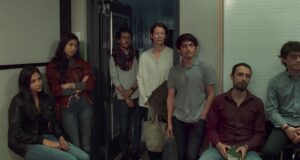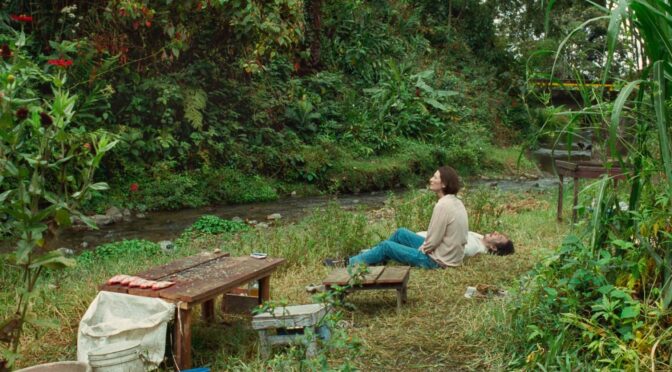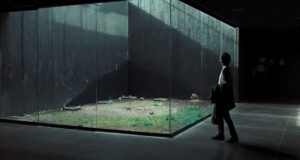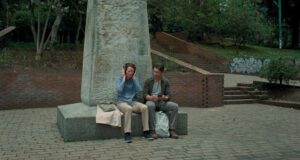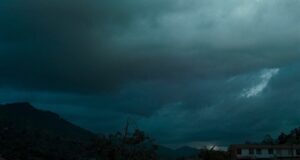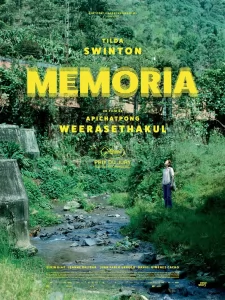
My favorite poet is Edward Arlington Robinson. Most of his works, such as “Eros Turranos” and the very famous, Paul Simon-inspiring “Richard Corey” seem to take place in turn-of-the-century (19th that is) smalltown New England, but he has a great one that takes place in actual England. In this poem, “Ben Jonson Entertains A Man From Stratford”, Robinson imagines the titular 16th century playwright and Shakespeare contemporary meeting one of Shakespeare’s hometown friends in a pub and regaling him with musings about the Bard. One line I’ve always loved is when Jonson speaks of Shakespeare’s testy literary relationship with time and its mysterious, nebulous, inexorable passing. He refers to it as “his monster Time” It’s an observation that has always resonated with me. I also have a kind of rambunctious frenemy relationship with the copet. The very idea of Time feels both fascinating and disquieting, inspiring and harrowing. Time is a thing to be wrestled with and reckoned with and many of my favorite artists have been those who have their own Time monsters to spar with. Linklater stretching time out in Boyhood and the Before trilogy while also weighing the idea that everything might be just one simultaneous instant. Brilliant documentaries like Manakamana and Time (go figure) grappling with how Time moves and is experienced. Tarantino chopping up the temporal order of events in Pulp Fiction for maximum emotional and thematic oomph. Some artists regard it with awe and mystery and some just send Marty McFly whizzing back to the 1950s, turn time into a child’s playtoy and leave the metaphysical debates for the philosophers to figure out. After all, nobody ever said you had to take Time seriously. Thai filmmaker Apichatpong Weerasethakul (he prefers the name Joe) is one of those deeply philosophical types, a man who beholds the mysteries of Time with a respectful humbled hush. His films, like his great Uncle Boonmee Who Can Recall His Past Lives often exist in a magical realist realm where all things, from ghosts to royal animal spirits to a man who dies every time he goes sleep, feel possible. The nature of existence suddenly unfurls to reveal a world unbeholden to the restraints of our rational senses. His explorations of Time take place in the present moment, from which we observe Time passing, but also hum with the energy of all the Time that passed through this space before we ever got here. In Memoria, we briefly hear a university professor talk about how wood absorbs everything that touches it, and Weerasethakul seems to be positing that maybe all present existence retains the energy of the histories that came before. His latest opus is another bewitching, at times deliberately inexplicable tone poem of history, life, death, sleep and magic.’
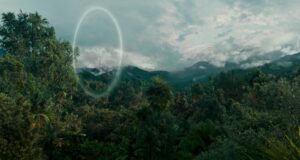
Weerasethakul’s films take place somewhere between the real world, the land of myth, and our dreams all at once. Their sense of reality is as nebulous as a fog bank and he encourages the viewer to loosen their thinking accordingly. In Memoria, he has found the ideal museum guide to take us through his latest placidly heady maze, that magnificent, statuesque extraterrestrial known to most by her Earth name, Tilda Swinton. Swinton plays Jessica, a Scottish woman living in the Colombian capital of Bogota where she is a flower vendor. We meet her on the morning she is visiting her sister, who has been sick in the hospital. On that morning, Jessica begins to sporadically hear a strange cacophonous sound. Her description of the noise is of very large concrete balls being dropped down a metallic well surrounded by sea water. She seems to be the only person able to hear it. Her sister’s anthropologist husband (Zama‘s Daniel Gimenez Cacho) puts her in touch with Hernan, a young music student who helps her to recreate, or at least approximate, the sound through recording technology. They begin a friendship until one day he disappears and nobody in his university music program seems aware he ever existed. Jessica eventually takes a trip into the rural mountains to look at an archeological site uncovered during a tunnel construction project and ends up meeting a villager also named Hernan, only some decades older. He could very well be the same Hernan, or some version of him. How much sense you can make of a revelation like this (and Weerasethakul never says you need to make sense of it all) feels like the key to how you experience his films. Have you ever had a dream where a character suddenly changed into someone else, but you also understood automatically that they still were that same person? I think it’s kind of like that, though I would never presume that my take is right with this man’s filmography. If you thought I was guiding you knowledgably through Memoria, I am delighted to inform you that we are actually both hopelessly and irretrievably lost. The new Hernan has an enigmatic relationship to Time and death and he has a memory that holds not only his thoughts but the collective experiences and traumas of everyone who ever lived in his village. He is also that same man who temporarily dies any time he takes a nap. All of this ties somehow to Jessica’s mystery noise, Colombia’s history, Jessica’s status as a white foreigner learning about an ancient non-white land, and just maybe the totality of what it means to live and die as a human being. It has the briefest of plots or the fullest of plots depending on how you look at it. It is very quietly, very unhurriedly about a great many things. Like Jessica’s own journey, the experience of watching Memoria is filled with both serenity and discombobulation of a gentle kind. We spend long minutes on static shots that linger on hospital wings, Bogotan cafe courtyards and Colombian river towns. And then, every now and again, that percussive sound jars us out of our trance again.

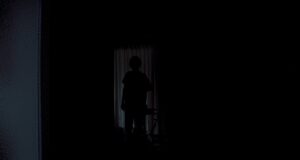


Memoria is a film about being unsettled and in that respect it’s the best such film I can name since Olivier Assayas’ Personal Shopper. What scant conventional narrative there is pales in comparison to the visual and sonic world that Weerasethakul conjures around us. It is a film deeply in tune with sonic texture. The bustle of pedestrian traffic or the low din of a restaurant crowd or the trickle of a Colombian mountain creek may seem banal, but Weerasethakul lets us spend enough time with them that they become entrancing. The film has explicit ideas and themes, but its focus is really about the enormity and bewilderment of existing in this big, mysterious world of ours. The way we do the best we can to process it with the starter pack of senses we are born with and how outmatched those faculties are in the face of everything. I think the times when our senses can barely make sense of things is where the magic lives for Weerasethakul. He means to very gently and lovingly short-circuit our brains. There’s a lovely and unnerving scene early on that focuses on nothing more than a parking lot full of cars at dawn. Then one of their alarms goes off and then other cars join in until they are all crowing their different sirens together. Then, one by one, they stop. Until there is finally silence again. No living thing is there in that parking lot and we do not hear anything before they go off, but something must have caused this chain reaction. Is it Jessica’s phantom noise that we can no longer hear when we aren’t sharing her point of view? Or is it some other force vibrating on some undetectable level? Our senses can’t process it in any direct way, yet the chorus of alarms testifies that something must be there, just beneath the feeble radars of our perceptions. And if our five main senses can be given the slip in this way, are things like reason and understanding not similarly susceptible? A Weerasethakul film aims to shake up our rigid notions of certainty about this world that holds us. He wants us to make room in our rational, scientific brains for the eerie, unexplainable and confounding. And while the result is meant to be disorienting and haunting, I think there is also a touch of something wonderful and sweet in the way he disorients us. His films feel as if they are possessed by friendly ghosts.
Memoria is fascinated by the nexus between the corporeal world and dreaming and it fittingly resembles nothing so much as the act of trying to describe a dream upon waking. There is that wonderful, patient scene where Jessica goes to the sound recording booth and she and Hernan try, step by step, to pinpoint the sound she keeps hearing. It’s a mesmerizing dance between our fantasies and all the tools of science, as Jessica and Hernan take the stuff of feverish imagination and run it through the sorting machine of logic and technology. The beautifully futile attempt to give language to the ineffable majesty of existing. In a Weerasethakul film, unlike most actual dreams, there isn’t really a moment where the strange power of the dreaming dissipates or loses its grip to the real and the rational. If anything, the film has us wake from what felt like real life into a dream. Dreams are real here. Memoria starts with what could be just a hallucination, watches Jessica hold it up to the light of day, and then slowly metamorphosizes into a rumination on how much wonder and bizarre phenomena are right there in front of us. It is a blurring of the lines between life and death, sleeping and waking, until they are one and the same. While waiting in a hospital hallway, a scientist opens up a doorway in front of Jessica. She informs her it is essentially a morgue, a place where bones and remains are being kept and puzzled over. A space for death. “Want to come have a look,” she asks with cheery politeness. Jessica does want to have a look and follows her in. And Joe Weerasethakul is similarly beckoning us in and inviting us to meditate, without any sense of fear or negativity, on life’s natural endpoint. Or maybe endpoints, for some. When the older Hernan awakes from his very long death siesta and looks up at Jessica, she inquires very matter-of-factly what temporarily dying is like. “Not bad,” he casually replies. “I just stopped.” Again, as much as Memoria is the story of Jessica being unsettled by a sensation she cannot explain, its attitude toward the unknown is one of peaceful curiosity and even hushed excitement. What a wonder to be in this beautiful place and to still have so very much to know about it. With as much death as I have felt surrounded by in the last few years, watching Weerasethakul muse on it with such wisdom, calm and childlike wonder felt like a thing I needed. It made for one of 2021’s most soothing cinematic odysseys.
Memoria is a notable example of a film that teaches you to watch it (and using that buzzy film phrase allows me to mark another square on my Cinema Bingo card). You might find parallels to it in the hushed meditations on nature in Terrence Malick’s films of in the long static shots of Malaysian filmmaker Tsai Ming Liang. But Joe Weerasethakul has long developed a rhythm all his own. As he does in that car alarm scene, his hypnotic patient takes suggest a world just under the surface of what we can see and feel. We all (sigh, most of us) believe in things like microscopic bacteria, sound waves that only certain creatures can pick up on, and even a part of our own brains that is virtually inaccessible to our conscious minds most of the time. Weeraethakul’s films whisper tome that if I can believe in those wondrous, hidden phenomena, who knows what else could be happening just beyond the fumbling grasp of my human senses. His films are an invitation to be quite and still but also alert, anticipating what might happen next. It feels like stretching a muscle one rarely uses, and it feels downright subversive in a cultural landscape with no shortage of frenetic entertainments. There is, to use an old cliche, nothing quite like it. If you have the urge to expand your definition of what an adventure film can be, Memoria is a transcendental trek into the wildernesses of Time, life, death, and the human self. And of course, if you ever feel confused or dumbfounded by what this unique cinematic object is up to, you can just look into the paradoxically open and inscrutable face of the incomparable Tilda Swinton. Behold the mixture of awe and disorientation that dances across her eyes. Her expression will tell you that you are entirely right in being puzzled and lost here in Weerasethakul’s haunting Colombian trance state. It will also tell you that it can be bracing fun to not always know where you are going.
Memoria has a lot to say about letting fo and allowing one’s self to be taken on a journey into someone else’s world. It is partly, I think, about the value of opening up to others’ stories. Weerasethakul has certainly done that by crossing the Pacific Ocean to Colombia and making his first film outside of the Asian continent. Tilda Swinton has left the Scottish Quarter of the Milky Way and acted in a film where at least half of the dialogue is in Spanish. And Swinton’s character within the film undertakes a trip outside of her own comfort zone through Bogota, out into the Colombian mountains and beyond in order to catch some part of a story that is much larger than her and older than her and also crucially not really about her. It’s a beautiful and necessary thing to let yourself be touched by stories that are not really about you. It’s as good for warding off narcissism and myopia as oranges are for scurvy. I cannot overstate how vital and soul-expanding it is to fill your life with stories that are not your own. Memoria also quietly and implicitly critiques the way white people, well meaning or not, can plunder non-white experiences for their own benefit in an exploitive way. Jessica’s sister speaks of a tribe her anthropology crew is researching that does not wish to open themselves up, mentally and culturally, for the world to probe. We are blessed to have the chance to take in a multitude of stories and perspectives, but we are also not entitled to every last one of them. Some of the world’s mysteries should be allowed to stay mysteries. It is just one more way that Joe Weerasethakul is teaching his audience to be still, curious, and respectfully receptive to the overlapping buzz of narratives all around us. That is the nature of cinema’s empathy-invoking power. You walk into a dark space and an artist introduces you to some people you’ve never met. Some are real and some are fictions conjured by actors. Either way, you sit quietly and you learn about them, while maybe learning a bit more about yourself too. Sometimes the intent of the story is to inform you and educate you. To shed light on some important subject or to illuminate an idea, so you can walk into the theater lobby with a firmer grasp on existence. Films to bolster our understanding and give us newfound clarity. I appreciate films like that. Still I’m very thankful they are not all like that.
